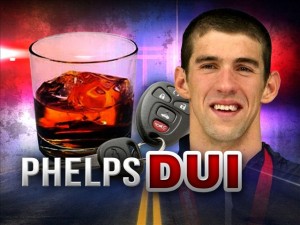 What does the average John Doe have in common with 18-time Olympic gold medalist swimmer Michael Phelps? From a legal standpoint, the answer might be more than you’d expect—they’re both: a.) human, and hence predisposed to momentary lapses in judgment; b.) subject to the same laws and equal treatment before the justice system; and c.) oblivious or uninformed regarding the intricacies of the legal system. The takeaway? Unfortunately, DUI arrests can happen to anyone, and when they do choosing the right DUI/DWI defense attorney is critical for any defendant—regardless of superstar status. A closer look at Phelps’ most recent arrest provides an excellent case study on effectively managing a DUI charge from start to finish.
What does the average John Doe have in common with 18-time Olympic gold medalist swimmer Michael Phelps? From a legal standpoint, the answer might be more than you’d expect—they’re both: a.) human, and hence predisposed to momentary lapses in judgment; b.) subject to the same laws and equal treatment before the justice system; and c.) oblivious or uninformed regarding the intricacies of the legal system. The takeaway? Unfortunately, DUI arrests can happen to anyone, and when they do choosing the right DUI/DWI defense attorney is critical for any defendant—regardless of superstar status. A closer look at Phelps’ most recent arrest provides an excellent case study on effectively managing a DUI charge from start to finish.
Phase I: The Initial Arrest:
Michael Phelps was arrested on September 30, 2014 at 1:40 a.m. by the Maryland Transportation Authority Police on Interstate 395 outside the Fort McHenry Tunnel in Baltimore for speeding 84 mph in a 45 mph zone and performing an illegal lane change across a double-line marking directly in front of an oncoming tractor-trailer. After being pulled over, Phelps consented to perform the common “Walk and Turn” Field Sobriety Test (FST) during which he exhibited several obvious signs of impairment associated with intoxication. When he was then requested to complete the “One Leg Stand” FST, Phelps responded: “That’s not going to happen” at which point he was officially taken into custody and transported to the police station where a breathalyzer test confirmed his blood alcohol concentration to be 0.14. Phelps was subsequently arrested and charged with Driving Under the Influence (Maryland Code Section 21-902(a)(1)), Driving Under the Influence Per Se (Code Section 21-902(a)(2), Driving While Impaired (Code Section 21-902(b)(1), and two payable traffic violations of 1.) Speeding and 2.) Crossing the Double Yellow Line.
Legal Takeaways:
Be Responsible: DUI’s are a Widespread (But Preventable) Problem:
The best advice I can give you to prevent getting a DUI arrest is simply don’t drink and drive. Seems pretty straightforward, but according to a recent study by the Substance Abuse and Mental Health Administration, nearly 10.3 million people reported driving under the influence in 2012 and half of all highway fatalities tested positive for elevated blood alcohol concentrations. At the time of Phelps’ arrest, his BAC was .14—nearly double the legal limit in Maryland of .08. Keep in mind that exceptionally high BAC readings can result in aggravated or extreme DUI charges that carry stiffer penalties. Phelps seemingly dodged a bullet here—the aggravated DUI charge isn’t incurrent unless the BAC is 0.15 or higher. Use a designated driver, call a cab, or walk; by being responsible you’re already swimming laps around Phelps…at least from a criminal defense attorney’s perspective.
Obey All Traffic Laws:
For a conviction to stick, police have to provide a reasonable suspicion to initiate a DUI stop. In Phelps’ case, this wasn’t much of an issue as he was going well over 40 mph over the posted speed limit and driving erratically. However, the infraction(s) don’t have to be that obvious for you to get pulled over. While you shouldn’t be drinking and driving in the first place, be sure to follow ALL standard traffic laws and regulations for both your physical and legal well-being.
Know (And Exercise) Your Rights:
Phelps made a couple of mistakes after being pulled over. Most significantly, he initially consented to perform an FST—which he promptly failed before being taken into custody. It is perfectly within your rights to refuse to perform an FST, especially when you believe you have been wrongly suspected of a DUI infraction. They are only tools used by police to provide a reasonable cause to take you into custody and perform a Breathalyzer test. Additionally, Phelps spoke to the police at length before being arrested, including his comment “That’s not going to happen”. Remember, anything you say can be used against you in a court of law so it’s important you consult with your attorney before providing any potentially self-incriminating statements.
Phase II: The Aftermath:
This wasn’t Phelps’ first run-in with the law regarding substance abuse. He was previously pleaded guilty to violating 21-902(b)(1), a DWI offense, on November 4, 2004 and received a Probation Before Judgment (PBJ) disposition which he successfully completed resulting in the charges being expunged from his record (Maryland Probation Before Judgment Guidelines) . This means he didn’t receive a formal conviction in 2004 and thus was not charged as a repeat offender in his latest court appearance—a significant detail as subsequent offenders face harsher punishment guidelines than first-time offenders. Phelps again pleaded guilty to his most recent conviction, with Baltimore District Court Judge Nathan Braverman handing down a one-year prison sentence that he subsequently suspended in favor of an 18-month supervised probation that includes random alcohol and drug testing, completion of a 45-day treatment program in Arizona, and participation in a weekly Alcoholics Anonymous meeting.
Legal Takeaways:
Hire the Right Lawyer For YOU
Don’t make the mistake of thinking you can defend a DUI charge on your own. Although it’s commonly regarded as a cut-and dried legal proceeding, DUI litigation is widely varied given the location of offense, tendencies of the presiding judge in prior rulings, and the defendant’s legal history. A good DUI attorney can advise you what to say and when; keep track of legal filings and deadlines; negotiate with prosecutors and/or judges; and work to expunge your conviction. Therefore, it’s key to choose a competent, dedicated DUI defense attorney familiar with the specifics of the local court and understanding of the judge’s approach to these type of cases in order to develop the best defense strategy for you. Phelps did just that—retaining high-profile defense attorney Steve Allen who had considerable practical litigation experience in Baltimore and was able to negotiate a favorable sentencing that allows his client to avoid jail time and continue his training regime for the upcoming Olympic games.
Although you might not have millions to shell out for a celebrity-caliber lawyer, you shouldn’t rely on public defenders in DUI cases as many are overburdened and unable to dedicate the time and personal attention you deserve. Likewise, you shouldn’t opt for the cheapest lawyer out there or be enticed by glossy ads. Instead, be sure to do your research and find an attorney who a.) has a proven DUI-defense track record in court system you’ll be tried in; b.) honestly believes he can achieve a desirable outcome given your specific circumstances; c.) provides an open and detailed line of communication in all stages of legal proceedings; and d.) outlines an up-front financial payment plan for services rendered. Remember, DUI’s punishments have and will continue to escalate—you want the best attorney possible on your side.
Disclaimer: This article is for informational purposes only. It does not create the attorney-client relationship. Please contact Scott MacMullan Law, LLCat 443-494-9775 if you seek legal advice.
[do action=”blackwall-hitch”/]










































